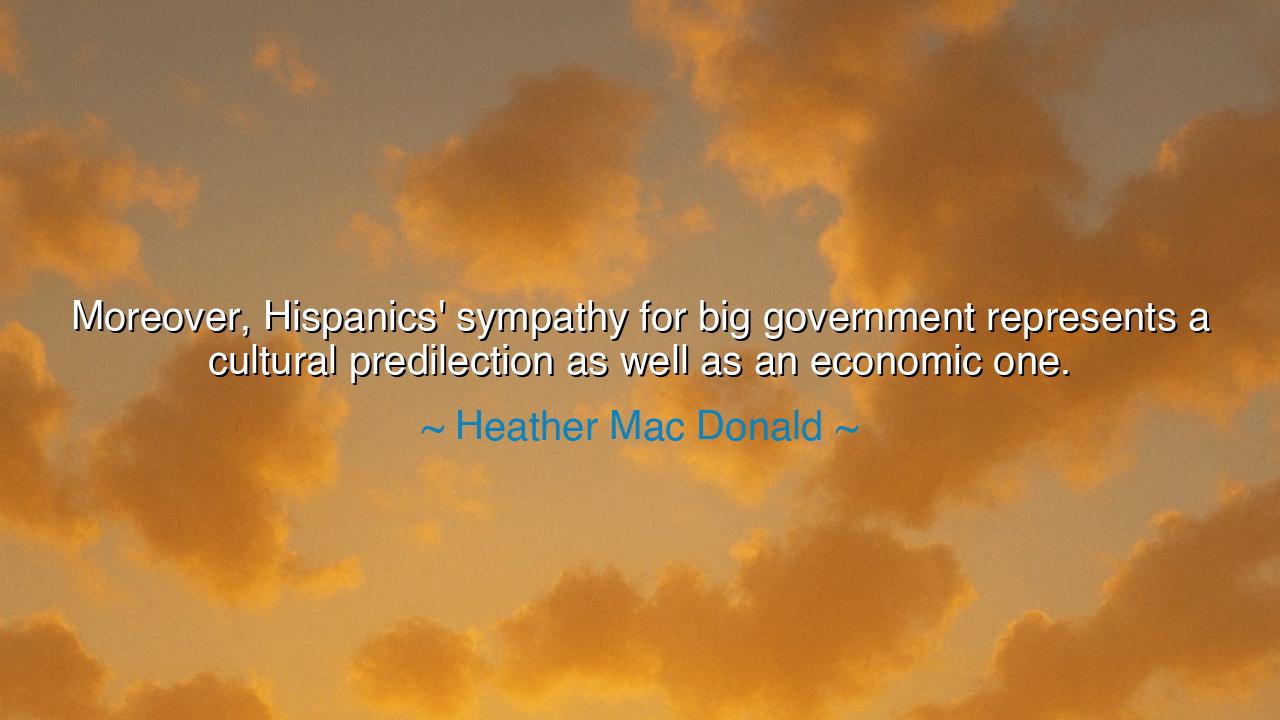
Moreover, Hispanics' sympathy for big government represents a
Moreover, Hispanics' sympathy for big government represents a cultural predilection as well as an economic one.






Children, gather close, for I speak to you of the deep currents of culture and economics that shape the choices and beliefs of peoples across the ages. In the words of Heather Mac Donald, we find a thought that speaks to the very essence of human behavior: "Moreover, Hispanics' sympathy for big government represents a cultural predilection as well as an economic one." These words invite us to understand that what drives us in life, what shapes our beliefs and actions, is often not just about individual choices, but about the larger forces that surround us—forces that are both cultural and economic.
In the ancient world, the people were shaped by the societies they lived in, much as the Hispanic community is shaped by the forces of culture and economics. The Romans understood this well, for they saw that the greatness of a nation was not simply in its laws, but in the way those laws were rooted in the values and traditions of the people. Consider the plebeians, the common folk of Rome, whose loyalty to the state was often bought through protection and support from the governing powers. The Romans understood that the relationship between the governed and their rulers was shaped by more than just policy—it was shaped by a shared cultural understanding of what was owed to each other. Similarly, the Hispanic community’s affection for big government reflects a deep-rooted belief in the role of the state as a protector and provider—not just through economic policy, but through the cultural values that have shaped the lives of many generations.
To understand this dynamic, children, look at the ancient Greeks, who spoke often of the relationship between citizen and state. They believed that the polis, the city-state, was the very soul of society—a place where the welfare of the people and the strength of the government were intertwined. In the same way, big government—for the Hispanic community and many others—is not just a collection of rules, but a reflection of the values that people hold dear: family, community, and mutual support. This sense of loyalty to the state is not just about economics, but about a cultural heritage that views the government as a force for good, a protector of the people. The love for big government is thus rooted in a cultural trust—the belief that it is the state's role to provide security, education, and welfare for all its citizens, especially in times of need.
Hispanic cultures, much like the Romans of old, have long understood the importance of community over individualism. In societies where family and social connections are central, the idea that the government should play a strong, supportive role in ensuring the well-being of individuals becomes almost natural. The state, in this view, is a caring entity, one that ensures that no one is left behind—especially those who are most vulnerable. This cultural preference is deeply embedded in the values of solidarity, interdependence, and shared responsibility, values that have been passed down through generations in many Hispanic communities. When Heather Mac Donald speaks of this cultural predilection, she points to an ancient belief that the well-being of the community is inextricably tied to the support provided by the government, and by extension, the community’s loyalty to that government.
Yet, children, it is also important to recognize that economic forces play a role in shaping this relationship. In ancient societies, such as those of the Egyptians or Mesopotamians, the government was often seen as a protector of resources and a stabilizing force during times of scarcity. The idea of a big government is not a new one; it is rooted in the economic reality that governments, throughout history, have been tasked with managing the distribution of wealth, food, and resources, particularly in times of hardship. The Hispanic community’s support for big government can be understood through this lens—where economic inequality and the need for social safety nets encourage a reliance on state support. Just as the pharaohs of Egypt controlled the grain stores to ensure survival during lean years, so too does the modern government play a role in ensuring that no one is left without the basic necessities of life.
Thus, children, the lesson here is not just about politics or economic theory, but about the deep connections between culture, economics, and the role of government in society. We must understand that sympathy for big government is not merely about a desire for handouts or paternalistic care—it is a recognition that, in times of uncertainty, the government is seen as a unifier, a provider, and a protector. In the same way the Romans viewed the state as a necessary partner in their lives, so too do many Hispanic communities see government as a partner in their collective well-being.
So, children, as you navigate your own lives, remember this: no society is built in isolation. The well-being of individuals is tied to the strength of their communities, and the strength of their communities often depends on the role of the government in their lives. Do not view government simply as a force of power, but as an instrument for unity and protection. Whether in ancient times or today, the relationship between the people and their rulers is a reflection of the values that hold society together—values of solidarity, mutual aid, and shared responsibility. When you seek to understand the dynamics of power, look not only at the economic needs of the people, but at the cultural values that drive them to seek collective solutions, and you will come to understand the deeper forces that shape the world.






AAdministratorAdministrator
Welcome, honored guests. Please leave a comment, we will respond soon